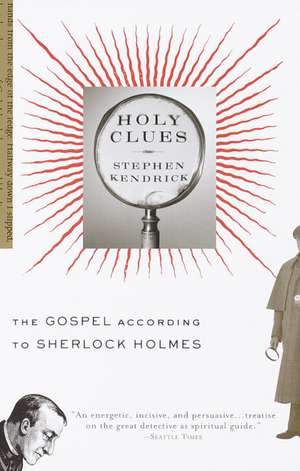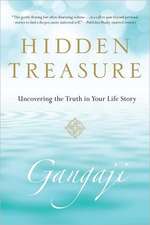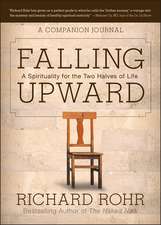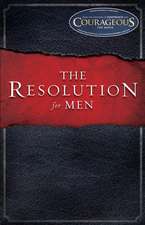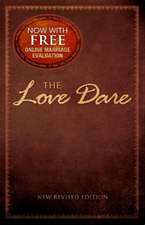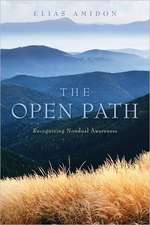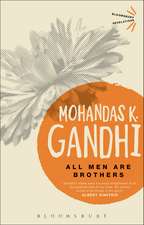Holy Clues: The Gospel According to Sherlock Holmes
Autor Stephen Kendricken Limba Engleză Paperback – 30 iun 2000
Drawing on the teachings of Christianity, Buddhism, and Judaism--as well as a host of thinkers as varied as Albert Einstein, Gandhi, and Vincent van Gogh--Kendrick explores the stories of Sherlock Holmes and finds remarkably prescient religious insights. He shows us the link between careful observation of clues and the Buddhist concept of "Bare Attention." He illuminates the parallel between the great sleuth's pursuit of justice and God's actions on the scene of the first murder, when Cain slew Abel. And in the detective's open, engaged mind, Kendrick finds a model for uniting the principles of science with a sincere spiritual quest. The result is a book of inspiration for the modern, skeptical searcher--and an entertaining work that sheds new light on the methods of the world's greatest detective.
Preț: 116.35 lei
Nou
22.27€ • 23.16$ • 18.66£
Carte disponibilă
Livrare economică 20 februarie-06 martie
Specificații
ISBN-10: 0375703381
Pagini: 208
Ilustrații: 11 ILLUSTRATIONS THROUGHOUT
Dimensiuni: 133 x 204 x 17 mm
Greutate: 0.22 kg
Editura: Vintage Publishing
Notă biografică
Extras
The worst roommate of all time must have been Mr. Sherlock Holmes, who kept tobacco in the toe of his slipper, performed malodorous chemical experiments at all hours, saluted his queen by forming the letters V.R. on his Baker Street walls with bullet holes, and, in general, lived a chaotic and eccentric life.
The worst part of all for the faithful John H. Watson, fiction's most famous roomie, must have been the many and wearying demonstrations of his own slowness in the mental department. Dr. John H. Watson is not a fool, but he accepts that part of the bargain of being Holmes's partner in adventure is to have to endure being shown up over and over: "I trust that I am not more dense than my neighbors, but I was always oppressed with a sense of my own stupidity in my dealings with Sherlock Holmes." In fact, it is an old narrative trick, as old as the easily awed questioners of Socrates and the inability of Jesus' disciples to understand the message of their teacher, highlighting genius with an ordinary soul standing in for you and me. Besides, Holmes cannot be a teacher without a dutiful student.
At the beginning of the first short story, "A Scandal in Bohemia," Holmes performs his favorite trick, one that often begins the stories. He deduces from small details of Watson's appearance, clothing, and shoes that his friend has been walking in the country, has a careless servant girl, and is back in medical practice. After carefully detailing how he picked up all the little clues, Watson laughs. "When I hear you give your reasons, the thing always appears to me to be so ridiculously simple that I could easily do it myself, though at each successive instance of your reasoning I am baffled until you explain your process. And yet I believe my eyes are as good as yours."
Holmes agrees, and makes one of the most important statements in all the canon: "You see, but you do not observe."
Then he challenges Watson to state how many steps lead to 221-B, steps he has climbed hundreds of times.
"How many? I don't know."
"Quite so! You have not observed. And yet you have seen. That is just my point."
The answer is seventeen, a relatively insignificant fact, to be sure, but Holmes is absolutely insistent that each one of us must learn to see this world in just such a clear way. Watson never quite awakens to the fact that he is living with someone as focused as a Zen master, a spiritual teacher who just happens to have a fondness for tracking down criminals. Despite the light tone of the stories and their sly wit, Holmes is not playing a game with his "teachings" but rather enacting quite serious demonstrations about how to truly see our world. These stories are, at last, not just about apprehending criminals, but about apprehending reality. The detective is instructing his friend to learn what Buddhists call "bare attention." An old Zen tale describes a student badgering the teacher Ichu over and over about the core of the teaching. The master writes with his brush the word Attention. Not satisfied, the student asks, "Is that it?" In response, he writes, Attention, Attention. Now irritated, the student replies, "What is profound about that?" Writing the word three times, he calmly answers, "Attention means attention."
Which means the moment of perception before our thoughts take over, before our concepts and notions intervene. Bare attention is seeing things as they exactly are. Holmes sees with brilliance, true, but he sees, more importantly, with keen accuracy and without grand theories that twist truth into ideas and down blind alleys. The Buddhist psychotherapist Mark Epstein describes bare attention as "impartial, open, nonjudgmental, interested, patient, fearless, and impersonal."
Jesus speaks to this in Matthew, alluding to Isaiah's observation that "You shall indeed hear but never understand, and you shall indeed see but never perceive. . . ." To which Jesus adds: "Blessed are your eyes, for they see, and your ears, for they hear. Truly, I say to you, many prophets and righteous men longed to see what you see, and did not see it . . ." (13:16). Not to mention police!
You and I are generally used to seeing things the way Watson does. Holmes is not content, however; he clearly thinks anyone can reach insight in the way we approach seeing. The problem is that our usual vision is equivalent to blindness. The Jewish writer Abraham Joshua Heschel states it in another fashion: "The demand, as understood in Biblical religion, is to be alert and open to what is happening. . . . Every moment is a new arrival, a new bestowal." Perhaps the worst sin, then, is to stop paying attention.
This chapter is perhaps the very heart of this book, outlining five principles drawn from the Holmes stories that show us how to see with new attention. I caution you, however, not to make the mistake of thinking that simply seeing with our eyes is the point. It is said Helen Keller was once asked if there was anything worse than being blind. She replied, "Having no vision."
An intriguing illustration of this is to be found in the Max Carrados detective stories that appeared in the Strand magazine, an attempt to capitalize on the popularity of the Holmes tales and which, unlike the vast majority of Sherlock's rivals, are actually still readable. (There is nothing as effective for raising your opinion of Arthur Conan Doyle as a writer than to read the dated and painfully dull works written in imitation of him.) The twist is that Max Carrados is blind. In the introductory story, "The Coin of Dionysus," Max tells his friend Carlyle, "Do you know, Louis, I always had a secret ambition to be a detective myself. . . . That makes you smile?"
"Well, certainly, the idea--"
"Yes, the idea of a blind detective--the blind tracking the alert--" Max replies.
But in fact, it is Carrados who solves the mysteries, not his sighted friend. Ernest Bramah wrote of his blind detective that he is "blind, quite blind, but so far from crippling his interests in life or his energies, his blindness has merely impelled him to develop those senses which in most of us lie half dormant and practically unused." It is unlikely that any of us will ever uncover a murderer, but no mystery in our lives can ever be solved without insight and, as we shall see, a little artistic vision. What is dormant within us must be brought to life, made vivid.
These following five instructions from the Master are what we need to become people capable of such inner vision and insight.
(1) nothing is little
(2) notice what you see
(3) the deceptiveness of the ordinary
(4) the bizarre is not necessarily mysterious
(5) presume nothing
Recenzii
"Holy Clues makes a convincing case for the proposition that a mystery story is always and inevitably a kind of morality tale." --Jonathan Kirsch, Los Angeles Times
"It has always been my contention that the complete Sherlock Holmes stories form a sort of secular Bible. . . . Beyond being merely clever, Holy Clues is unexpectedly moving and wise." -Nicholas Meyer, author of The Seven-Percent Solution
"Kendrock's lively readings of the Sherlock Holmes stories contain a deep sense of how attentiveness to the details of ordinary life can yield extraordinary insights into the life of the spirit." --Publishers Weekly
Textul de pe ultima copertă
Drawing on the teachings of Christianity, Buddhism, and Judaism -- as well as a host of thinkers as varied as Albert Einstein, Gandhi, and Vincent van Gogh -- Kendrick explores the stories of Sherlock Holmes and finds remarkably prescient religious insights. He shows us the link between careful observation of clues and the Buddhist concept of "Bare Attention". He illuminates the parallel between the great sleuth's pursuit of justice and God's actions on the scene of the first murder, when Cain slew Abel. And in the detective's open, engaged mind, Kendrick finds a model for uniting the principles of science with a sincere spiritual quest. The result is a book of inspiration for the modern, skeptical searcher -- and an entertaining work that sheds new light on the methods of the world's greatest detective.
